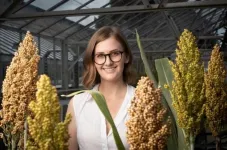(Press-News.org) LAWRENCE -- A new study from University of Kansas journalism & mass communication researchers examines what influences people to be susceptible to false information about health and argues big tech companies have a responsibility to help prevent the spread of misleading and dangerous information.
Researchers shared a fake news story with more than 750 participants that claimed a deficiency of vitamin B17 could cause cancer. Researchers then measured if how the article was presented -- including author credentials, writing style and whether the article was labeled as "suspicious" or "unverified" -- affected how participants perceived its credibility and whether they would adhere to the article's recommendations or share it on social media. The findings showed that information presentation did not influence how people perceived it and that only social media efficacy played a role in whether respondents said they would share it.
Hong Tien Vu, assistant professor of journalism & mass communications, and Yvonnes Chen, associate professor of journalism & mass communications at KU, co-wrote the study. They will present their work, funded by a KU General Research Fund grant, at the 2021 International Communication Association Conference.
Vu and Chen shared eight versions of an article verified as false with respondents that claimed a lack of vitamin B17, which does not exist, could be a cause of cancer. In one version, it included a doctor's byline, including a short description of her medical credentials. In another version, the author was described as a mother of two with a background in creative writing who was a lifestyle blogger in another. Some versions followed a journalistic style, while others used more casual language.
"We wanted to test two skills that are often employed in media literacy training programs around the world, author credentials and writing style, as well as flagging," Vu said. "The results suggest relying on audience members to do the work to determine fake news may be a long way to go. When people have to evaluate the credibility of information, it requires mental work. When surfing the web in general, we tend to rely on big tech companies to verify information."
Respondents who showed higher levels of social media efficacy, or were more savvy in using the technology, evaluated information more carefully and reported they would be less likely to share the article. Health orientation, or whether or not respondents were interested in or sought out health information, did not play a role in discerning accuracy of information. It is significant, however, as those highly interested in health information are more likely to share news they find, whether credible or not, the authors said.
Results showed that author credentials and how the story was written did not have significant differences on how people perceived its credibility, whether they would adhere to its recommendations or share it. However, those who saw the article presented with any sort of flagging stating it was not verified information were significantly less likely to find it credible, adhere to recommendations or share it.
While the study took place before the COVID-19 pandemic, its findings are especially relevant, as misinformation and politicized information about the pandemic have proliferated. It shows seemingly innocuous misinformation can be dangerous as well.
"One problem with fake news studies is the topic becomes so politicized," Vu said. "Fake news can be about something that is not politicized or polarizing as well. Talking about vitamin B17 seems to be harmless, but people believed it. People can spend time, money and efforts on trying to find a cure, and that can be very dangerous if you don't follow a doctor's advice and come across false information."
The fact that any sort of flagging information significantly affected readers' perceptions and intentions to share show how important it is for big technology companies such as social media platforms to verify information or label content that has false, unverified or dangerous information, the authors wrote.
"Whenever we see information that has been flagged, we immediately raise our skepticism, even if we don't agree with it. Big tech companies have a very important role to play in ensuring a healthy, clean information environment," Vu said.
INFORMATION:
AMES, Iowa - Inspired by nature's work to build spiky structures in caves, engineers at Iowa State University have developed technology capable of recovering pure and precious metals from the alloys in our old phones and other electrical waste.
Using controlled applications of oxygen and relatively low temperatures, the engineers say they can dealloy a metal by slowly moving the most reactive components to the surface where they form stalagmite-like spikes of metal oxides.
That leaves the least-reactive components in a purified, liquid core surrounded by brittle metal-oxide spikes "to create a so-called 'ship-in-a-bottle structure,'" said Martin Thuo, the leader of the research project and an associate professor of materials science and ...
A type of ultrasound scan can detect cancer tissue left behind after a brain tumour is removed more sensitively than surgeons, and could improve the outcome from operations, a new study suggests.
The new ultrasound technique, called shear wave elastography, could be used during brain surgery to detect residual cancerous tissue, allowing surgeons to remove as much as possible.
Researchers believe that the new type of scan, which is much faster to carry out and more affordable than 'gold standard' MRI scans, has the potential to reduce a patient's risk of relapse by cutting the chances that a tumour will grow ...
The amount of green space surrounding children's homes could be important for their risk of developing ADHD. This is shown by new research results from iPSYCH.
A team of researchers from Aarhus University has studied how green space around the residence affects the risk of children and adolescents being diagnosed with ADHD. And the researchers find an association.
"Our findings show that children who have been exposed to less green surroundings in their residential area in early childhood, which we define as lasting up until age five, have an increased risk of receiving an ADHD diagnosis when compared to children who have been surrounded by the highest level of green space," says ...
Anorexia nervosa, bulimia nervosa and binge-eating disorder are the three main eating disorders that 4 out of in 10 individuals living in Western Europe will experience at some point in their lives. In recent years, studies on the genetic basis of anorexia nervosa have highlighted the existence of predisposing genetic markers, which are shared with other psychiatric disorders. By analysing the genome of tens of thousands of British people, a team from the University of Geneva (UNIGE), the University Hospitals of Geneva (HUG), King's College London, the University College London, the University of North Carolina (UNC) and The Icahn ...
Research from the University of Kent has led to the development of the MeshCODE theory, a revolutionary new theory for understanding brain and memory function. This discovery may be the beginning of a new understanding of brain function and in treating brain diseases such as Alzheimer's.
In a paper published by Frontiers in Molecular Neuroscience, Dr Ben Goult from Kent's School of Biosciences describes how his new theory views the brain as an organic supercomputer running a complex binary code with neuronal cells working as a mechanical computer. He explains ...
Gene editing technology will play a vital role in climate-proofing future crops to protect global food supplies, according to scientists at The University of Queensland.
Biotechnologist Dr Karen Massel from UQ's Centre for Crop Science has published a review of gene editing technologies such as CRISPR-Cas9 to safeguard food security in farming systems under stress from extreme and variable climate conditions.
"Farmers have been manipulating the DNA of plants using conventional breeding technologies for millennia, and now with new gene-editing technologies, we can do this with unprecedented safety, precision and speed," Dr Massel said.
"This type of gene editing mimics the way cells repair in nature."
Her review recommended ...
New research from the University of Kent reveals social cohesion with immigration is best ensured through childhood exposure to diversity in local neighbourhoods, leading to acceptance of other groups.
The research, which is published in Oxford Economic Papers, builds on the Nobel Laureate economist Thomas Schelling's Model of Segregation, which showed that a slight preference by individuals and families towards their own groups can eventually result in complete segregation of communities.
Shedding new light on this issue, researchers from Kent's School of Economics have introduced the theory ...
Will we enjoy our work more once routine tasks are automated? - Not necessarily, suggests a recent study
Research conducted at Åbo Akademi University suggests that when routine work tasks are being replaced with intelligent technologies, the result may be that employees no longer experience their work as meaningful.
Advances in new technologies such as artificial intelligence, robotics and digital applications have recently resurrected discussions and speculations about the future of working life. Researchers predict that new technologies will affect, in particular, routine and structured work tasks. According to estimations, 7-35 percent ...
Home Office data shows the number of police officers voluntarily resigning from the force in England and Wales has more than doubled in the last eight years.
Scant attention has been paid to the reason for this mass exodus. Until now. Researchers from the University of Portsmouth studied government statistics, and discovered the numbers of officers voluntarily resigning from the police service is rising - from 1,158 in the year ending March 2012 to 2,363 in the year ending March 2020. The figure amounts to 1.83 per cent of the total police officer population in England and Wales up from 0.86 per cent eight years ago.
Dr Sarah Charman, from the Institute of Criminal Justice Studies at the University of Portsmouth, led the study. ...
New research will enhance corona safety during cruises and help cruise lines to again attract passengers onboard
Researchers within Cell Biology and Industrial Management at Åbo Akademi University have developed models aimed at ensuring corona safety during cruises.
The coronavirus pandemic stopped the cruise industry more or less completely. Major international cruise lines, such as Royal Caribbean Group and Carnival Corporation, largely suspended their cruises during 2020, which resulted in practically zero turnover and losses amounting to billions.
Upon assignment by Business Finland, an interdisciplinary research team has been working to find solutions for managing the current crisis ...

